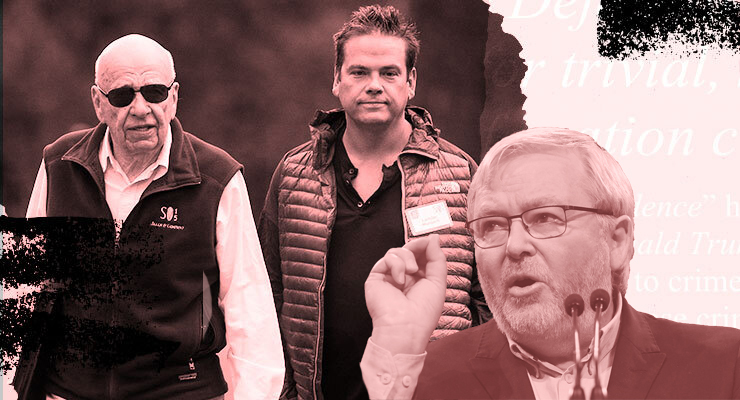
To donate to Crikey’s GoFundMe, click here.
The image of this American business magnate, heir to the most powerful news media empire in the world, launching defamation proceedings against a tiny media competitor over an article interrogating his role in the January 6 insurrection, is frankly stunning.
Independent MP Zoe Daniel’s planned motion in Parliament for a judicial inquiry to investigate Australia’s hideous concentration of media power should be cheered by everyone who wants to see a bigger, stronger, freer, and more diverse news media.
Daniel’s move comes after Labor and Greens senators last year endorsed a judicial inquiry with the powers of a royal commission, concluding after a year-long parliamentary inquiry that our “weak, fragmented and inconsistent” media laws needed full and independent examination. This was spurred by a record-breaking petition to Parliament, which recorded more than 500,000 signatures, and the matter is now shaping as an important question for Labor’s next National Conference.
As a former Washington correspondent, Daniel is well placed to spot the hallmarks of a country being dragged down the same abyss that Fox News has taken the United States. We’ve received similar warnings from former US director of national intelligence James Clapper, who also backs an inquiry. As someone who lives mostly in the United States, I see these warning signs as well.
Too many Americans dismissed Fox News as a right-wing curiosity that would inevitably fizzle out. It didn’t. Fox News kept growing until it conquered the Republican Party, just as Murdoch’s Sky News is now gaining ground inside the Liberal National Party.
With Daniel’s motion now on its way to Parliament, I encourage all of us who support a strong, free and diverse media to contact their local MP — Labor, Liberal, whomever — to convey their support.
I am not a lawyer, and I would not presume to comment on the merits of Murdoch’s case against Crikey. But his decision to sue Crikey raises for me more questions than it answers.
For example, why has Lachlan decided to sue in Australia, and why now?
This lawsuit has “made in America” stamped all over it. It is about an American billionaire, his American business, and the crusade by an American president to overturn an American election that culminated in American citizens breaking into the American Congress to intimidate (and potentially execute) American public officials.
These matters are of great public interest in America and have been discussed extensively there, where commentators have savaged the Murdochs in the baldest of terms. The debate has been fuelled by text messages confirming senior Fox employees were coordinating with Trump’s “stop the steal” effort, and lawsuits by voting machine companies who were falsely accused of electoral fraud (Fox News is defending these lawsuits, citing “freedom of the press”).
Lachlan Murdoch has had myriad opportunities to sue his American critics in the American courts over the past two years. But instead, he has now hired lawyers in far-flung Australia to sue one of the most modest media outlets in the English-speaking world.
Although Crikey is beloved by its subscribers, its overall influence is minuscule. Its subscription revenue is reportedly around $3 million per year (for perspective, Murdoch is reportedly spending $150 million on a new yacht). As Murdoch commentator Sophie Elsworth says of Crikey, “it’s very, very small, so I think mainstream Australians probably are not aware of what this website actually is”.
I wonder what harm Murdoch has suffered as a result of the Crikey article? Given the savage media criticism of the Murdochs in America, it is difficult to see how he can say that the Crikey article has had a serious effect on his reputation. It also seems very few people would have read the article before it was reposted, and it seems doubtful that Crikey’s progressive-leaning readers would have had a high opinion of Lachlan to begin with.
And what are we supposed to make of Rupert Murdoch’s apparent unwillingness to join the lawsuit?
Crikey’s article did not name Lachlan specifically, but “the Murdochs” in general. So if Rupert agrees with Lachlan about this article, shouldn’t he also be suing? And if he doesn’t, might we conclude that Rupert doesn’t mind the imputation of being Trump’s co-conspirator? Or, at the very least, that Rupert doesn’t consider Crikey’s article damaging enough to sue over? And if that’s not it, then why hasn’t Rupert sued?
The merits of Murdoch’s case are for the courts to decide. As someone who occasionally initiates defamation proceedings to correct the record (often, though not exclusively, against Murdoch), I do acknowledge Lachlan’s legal right. But Crikey also has the right to defend its journalism, and it needs help from all of us. If Crikey’s defence is overwhelmed merely because it is financially outgunned, the consequences for press freedom would be chilling. That’s why I’ve donated to the Crikey Defence Fund, and I encourage all Australians who support a strong, free and diverse media to do the same.
If this episode proves anything, it’s that our current system of media self-regulation is a complete farce. Murdoch is fortunate to afford defamation lawyers because, for most Australians, that is simply not a realistic option. The best most people can expect is an adjudication by the Australian Press Council — a long, tedious and bureaucratic process — after which, even if you succeed, you can simply be ignored by the publisher.
The fact that Murdoch has skipped the Press Council entirely and gone straight to his lawyers confirms what everyone in media and politics knows: it is a toothless pseudo-regulator, largely funded by News Corporation to disguise just how unfettered its power truly is.
Former prime minister Kevin Rudd is chair of Australians for a Murdoch Royal Commission.
This article is part of a series about a legal threat sent to Crikey by Lachlan Murdoch, over an article Crikey published about the January 6 riots in the US. For the series introduction go here, and for the full series go here.








Thank you Kevin.
I have donated.
Go Crikey!!!!
Here! Here!
Kevin, I guess better late than never!! I guess I ponder to why?? Successive governments (Labor/LNP) over the past 3 decades have been complicit in enabling the Murdoch’s to acquire such a high percentage of Australian Media…..and enabled such unfettered control and influence in Political process??
Howard changed the laws of media ownership for the Murdochs and it’s been downhill for Australia e er simce ecause that little favour paid out well in Murdoch media support for the coalition, and to the detriment of Labor.
Bad headlines daily is the best kind of negative publicity……..and Rupert/Lachlan understand that.
It’s time to let the Murdochs see
an empire is no guarantee
of winning when democracy must face the Trumpist threat,
so let the battle now be fought
by giving Crikey our support
or freedom of the press could well be something to forget.
Something rotten in the state of Skidmark, that’s for sure.
Donated. F this C in the A.
Did you mean encula?
At the 1:30 mark, one of Rupert’s Fox NEWS ‘entertainers’ says that the FBI constantly PLANT EVIDENCE.
Are we in Australia expected to remain as ignorant as his American audience.
WTF !!!
https://youtu.be/bEJTXIwvDCU
It used to be that the political parties of the rich needed a system of strong, publicly-funded law & order to protect their clients’ assets from the mob and facilitate ‘legal’ exploitation. So, the Republicans (US), the Conservatives (UK) and the Coalition (Australia) always painted themselves as “Law & Order” champions.
However, since decades of neo-liberalism turbo-charged the movement of wealth ever-upwards, the parties of the rich now find that publicly-funded law & order is more of a hindrance to their clients’ activities. Furthermore, their clients can now afford private armies.